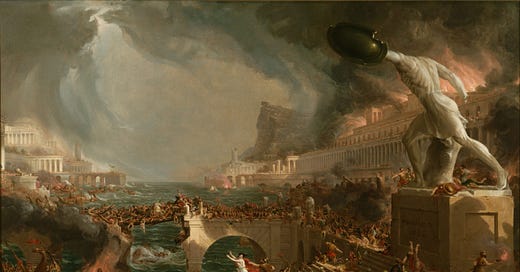Twilight of the Liberals
holy vibe shift batman
—/u/jacksonjules, replying to Scott Alexander’s latest post “How To Stop Worrying And Learn To Love Lynn's National IQ Estimates”
That vibe shift is real. A few years ago Scott didn’t dare to write phrases like “the N relevant N difference N between N homosexuality N and N pedophilia N is N moral N, not N biological” without those annoying Ns in the middle out of fear of being quoted out of context. Today he Lynn-posting unironically, without any Ns.
This comment only relates to a specific post by a specific blogger. But the vibe shift it identifies is so much larger. Wokism has declined. The MAGA era is upon us.Four years ago, people like Bernie Sanders and Matthew Yglesias had to withstand scorn for going on the Joe Rogan Experience. Rogan was considered too controversial, too far out of the mainstream. Today liberals are desperate, reflecting why their candidate couldn’t be “on Rogan”. Meanwhile, even Mencius Moldbug himself has entered the Cathedral.

But put all of that aside. There is only one (1) true indicator of where the vibes are at… What are the soulless corporations doing? Two weeks ago Mark Zuckerberg (universally known as the world’s most soulless man) announced his allegiance to the Conservative cause in social media moderation. In this he is essentially a latecomer. Jeff Bezos already made his move in October by vetoing the Kamala endorsement of his Washington Post. Today the Post still publishes under the motto of “Democracy Dies in Darkness”. But it is no more than a vestigial organ from a more liberal era. But neither of these oligarchs were as early and as thorough as Elon Musk. Who got handsomely rewarded with the ability to violate the Logan act with impunity and to set H1B policy.

How did this happen?
Asabiyyah
In his historiographic book Al-Muqaddimah (“The Introduction”) Ibn Khaldun introduced the concept of Asabiyyah. Sometimes translated as “social cohesion”.
It is this cohesion, which arises spontaneously in tribes and other small kinship groups, but which can be intensified and enlarged by a religious ideology, that provides the motive force that carries ruling groups to power. Its inevitable weakening, due to a complex combination of psychological, sociological, economic, and political factors, which Ibn Khaldūn analyzes with consummate skill, heralds the decline of a dynasty or empire and prepares the way for a new one, based on a group bound by a stronger cohesive force.
The paradigmatic examples of this process playing out would have been the Caliphate, or the Timurid Empire that was forming in his lifetime. A version of Asabiyyistic historiography has also found popularity in the west. Usually in the formulation “Hard times create strong men. Strong men create good times. Good times create weak men. And, weak men create hard times.”
I am not sure how useful Asabiyyah is in understanding the history of empires.1 But I have no doubt that it accurately describes the history of ideas. Or as I would formulate it: “Hard times create strong ideas. Strong ideas create hegemony. Hegemony creates bad ideas. And, bad ideas create hard times.”
The case of Originalism
I myself am of a fairly liberal disposition. So when I first encountered originalism I was prone to be biased against it. Especially as it was espoused by Conservatives, who I do not associate with intellectual rigor. But looked at objectively, you have to conclude that the originalists have created a system of jurisprudence that is much more rigorous than any alternative liberals have put forward. They did this despite being vastly outnumbered and decades for liberals to put together something in response. Where did they succeed where liberals failed?
Imagine being a Conservative at a law school. You have the intuition that the constitution should be interpreted more Conservatively. No way that Roe v. Wade was decided correctly. So you bring up your objections. Immediately, everyone jumps on you. All the faults in your thinking get pointed out in an attempt to prove how wrong you are about the law. Repeat that for three year of law school, and probably most of your professional career. And at the end of it you probably still have the same opinions, but your justifications have been sharpened and hardened to a crisp. Multiply this by thousands of Conservative law students and an infracstucture to coordinate, and you probably create a legal theory as rigourous as originalism.
Meanwhile imagine being a liberal at law school. Almost everyone around you agrees with your politics. When Roe v. Wade comes up you just say “women should have the right to choose” and everyone arounds you replies YASS QUEEN. The few that don’t agree probably don’t dare to say so too loudly. You never rigourously think through the underlying logic of our argument. And your legal philosophy remains wishy washy and unrefined.
Now originalism dominates the American judiciary. This is partially because Conservatives got lucky and managed to nominate more justices. But Republican appointees have been dominating the Supreme Court for a long time, and only recently has that actually lead to Conservative legal decisions. Casey v. Planned Parenthood was written by a Reagan appointee.
In their dominance, the Conservative legal movement seems to be heading into ideological decedance. I’m but an outsider, but from what I gather there is a rising appatite for ""Common Good Constitutionalism". Which strikes me as no more than the Conservative mirror to the “Living Constitution”. This movement got extra steam after Bostock v. Clayton County ruled that discrimination on trans status is sex discrimination. If Conservatives were wise they would know better than to go down this road. They won’t hold the court forever, and nobody will respect opinions based on Aquinas’ musings on natural law in the long or even the short run. But such is the innevitable decedance of ideology.2
Asabiyyah in the wild
I have been watching YouTube for a long time. And I have seen political YouTube communities come and go. Each and every case they enter the scene full of Asbiyyah, but they eventually fall into decadence. Most notably “Skeptics” and Breadtube. I can’t help but notice that in both of these communities started out mainly by critiquing opposing viewpoints as espoused in the content of others. But the more time went on the more their navels got gazed. Near the end of each of these movements they basically never engaged with outside critique at all. Such is the inevitable decadence of ideology.
But this process can work out on a much larger scale. Is dare postulate that the hegemonic ideologies of entire societies cycle by this same process. For several decades (big L) Liberalism was the dominant viewpoint of the entire society. All major institutions endorsed the values of Liberalism. Liberal ideas where rarely questioned. And because they were never questioned they metastasized into Wokeness. Wokeness starts from the same progressive starting point that normal Liberalism does. But while Liberism tries to remain withing the Overton window, Wokism takes them to the very extreme. Nevertheless, because Wokism lends its values from regular hegemonic Liberalism, it is extremely hard to critique it from within the hegemony. Instead, it festered until virtually everyone became sick of it. And in so doing it left a big heaping stink on Liberalism that could not be cleaned. Such is the inevitable decedance of ideology.
What the future holds.
Unless Donald Trump destroys liberal democracy in America (~20%) or AI kills everyone (~??%), I expect this cycle to continue. For the next decade or two, MAGA conservatism will probably be the hegemonic ideology of America for the next decade or two. Even if you’re liberal there are positive sides to that. Left-wingers are better at avant-garde art than right-wingers and it’s not even close. When conservativism is dominant avant garde art thrives. You could make a similar case that conservatives are better at norm-core art (though I’m less sure about that one), so the quality of art is bound to increase. And of course MAGA will overreach and fall as Wokism did. Such is the inevitable decadence of ideology.
In the west Rome is held up as the paradigmatic example of this cycle. But that fails to comprehend how slow the rise and fall of the Roman Empire really were. The Romans that conquered Britain were already more than a century into the good times, without any of predicted weakening. Meanwhile those that experienced the Sack of Rome were very deep into bad time, but seemingly lacked the strength those times ought to give. Maybe the analysis is salvageable by returning ti Ibn’s formulation. The late Romans may have had hard times, but they lacked essential “social cohesion”. I don’t know. Shrug.
In this case the reportedly polarized legal culture probably makes things worse by insulating Conservative lawyers from liberal critiques




But the risk of autocracy is really the highest in American history. The machinery that allow this organic correction is really at risk.
Funnily this happened in economics: the golden years of conservative economics (Chicago School) were in the 70s. After the capitalist restoration of the 80s, the left wing economists took traction. Today the only top economist whose ideas I can trace to Friedman is Cochrane.